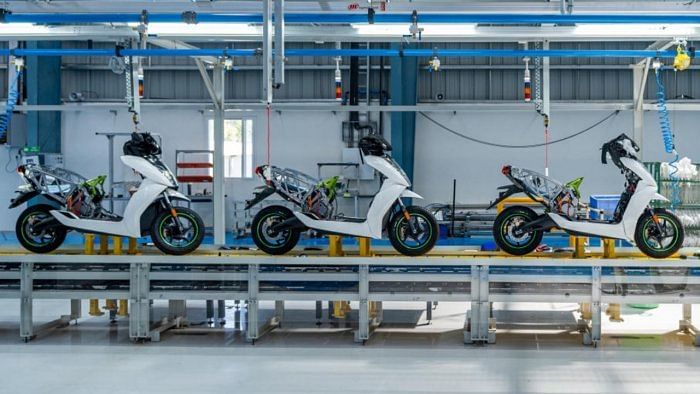
Aiming to emerge as India’s electric vehicle hub, the Tamil Nadu government on Tuesday released an exclusive policy for electric vehicles (EV) with a special focus on cell and battery manufacturing to garner investments worth Rs 50,000 crore in the sector and create 1.5 lakh jobs over a period of five years.
The state also plans to develop two exclusive EV parks in Manallur near Chennai and Hosur, which will also house a Future Mobility Park spread over an area of 300 acres. Hosur-Krishnagiri-Dharmapuri (HDK) region is already emerging as a hub for electric vehicles with Ola, Ather, and Simple Energy, already setting up their manufacturing units in the area. TVS Motor Company is also rolling out EVs from its factory in Hosur, while Ampere has built a brand-new factory in the Ranipet district.
The Tamil Nadu Electric Vehicles Policy 2023, the second in four years, focuses on measures on the supply and demand sides, much-needed charging infrastructure, and building the ecosystem for EVs. It also lays much emphasis on the component side, especially cell manufacturing, by offering a special capital subsidy of 20 per cent of investment in eligible fixed assets for new and expansion projects in advanced chemistry cells (ACC) manufacturing.
The policy, which will be valid for five years or till a new one comes into existence, also allows companies to avail of the special ACC capital subsidy from the date of commercial production or upon achieving the minimum eligible investment threshold of Rs 50 crore and minimum employment threshold of 50 jobs, whichever is later.
Other key features of the policy are 100 per cent reimbursement of Gross SGST payable on the sale of EVs manufactured in the state, turnover-based subsidy, capital subsidy of 15 per cent of investment in eligible fixed assets, 100 per cent exemption on electricity tax and stamp duty, subsidy on cost of land, and special incentives for the MSME sector.
“Our first policy (released in 2019) was aimed at getting an early upstart in the sector. As expected, we received a lot of investments in electric 2 and 3-wheelers. This policy is a maturation to the next stage and looks to leverage the advantage that the state possesses by focusing on enhanced incentives for cell manufacturing,” S Krishnan, Additional Chief Secretary (Industry), said.
Krishnan told DH that manufacturers of electric four-wheelers feel the need for building the ecosystem for greater adoption of electric cars and hence the policy has come up with several demand-side incentives to push more people towards EVs so that the demand for electric four-wheelers increases.
According to data released by the government, Tamil Nadu accounts for over 34 per cent of total planned investments in the EV sector with not just EV firms but battery manufacturers like BYD, Grinntech, Lucas-TVS, and Li Energy setting up their units in the state. The state believes the new policy will attract more players in the EV sector to set up their shops in Tamil Nadu.
Electrification of vehicular fleets in the state, converting private and commercial vehicles to EVs through waivers and exemptions, extending the exemption of road tax till December 2025 and promoting six cities as centres for implementing e-mobility solutions are some of the demand-side measures proposed by the policy.
The policy also proposes redesigning the curriculum in engineering and polytechnic colleges, launching short-term courses in select engineering colleges, linking the industry and academia and renewed impetus to promote research and development in the EV sector.
“We need to preserve the head start and maintain the flow of talent into the sector. Quality of the human resource in the sector should be strong and that is why there is a lot of focus on capacity building and skilling. We have also taken care to maximize the benefits to the environment and focus on shared mobility and public transportation,” Krishnan added.
Laying emphasis on accelerating the adoption of EVs in Tamil Nadu, the policy bats for providing the initial impetus for early adopters of electric vehicles through special demand incentives and developing charging infrastructure with favourable power tariffs through public/private measures.
Firms that establish public charging stations complying with the guidelines issued by the Union Government will be eligible for a 25 per cent subsidy of the cost involved in the purchase of equipment and machinery during the policy period.